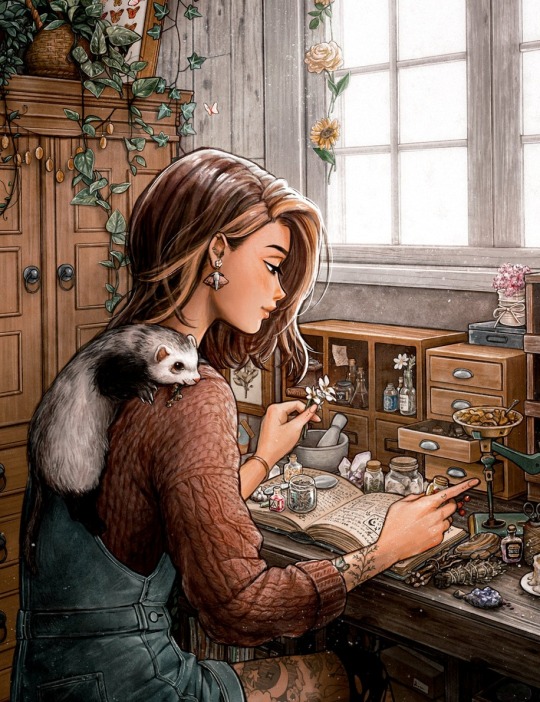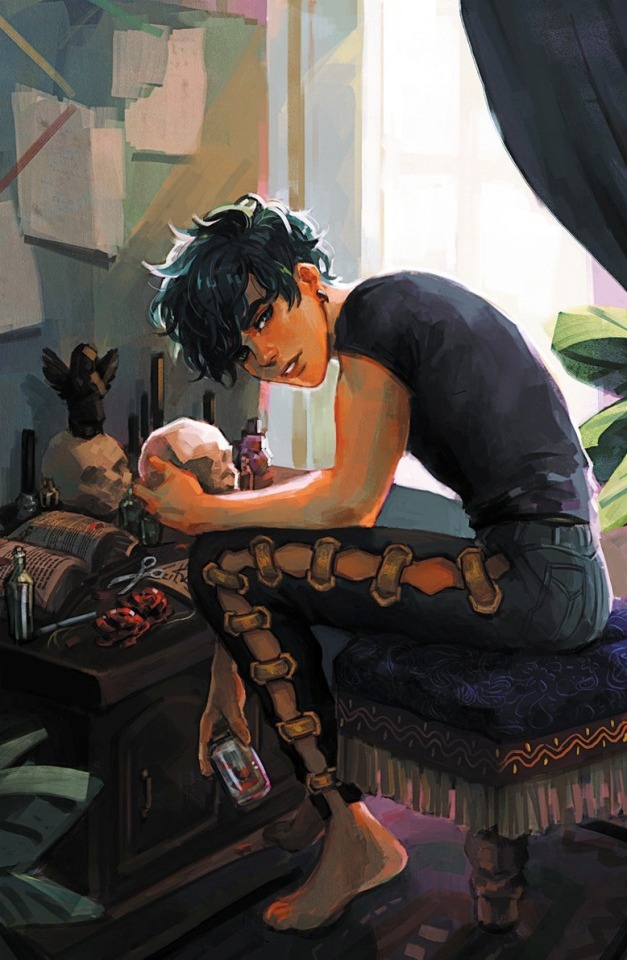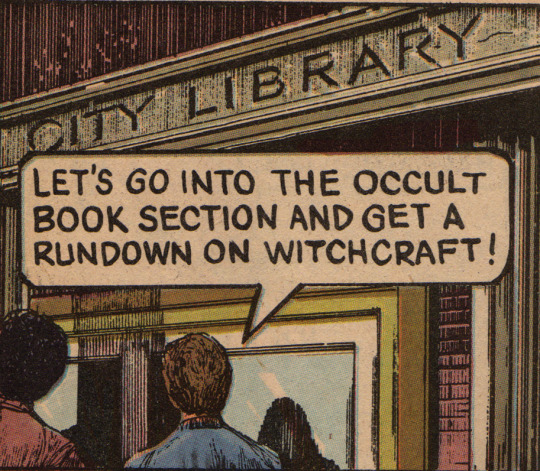Text
the heathen equivalent of the shoulder angel/devil is a dragon that thinks you’re a loser and never shuts the fuck up on one shoulder and an eagle who thinks the dragon is a loser but believes in you and calls you “champ.” Also they communicate via squirrel.
487 notes
·
View notes
Text
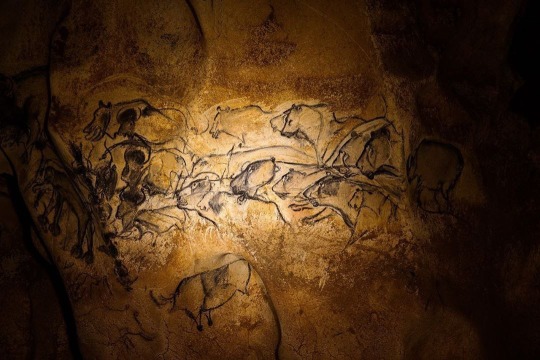

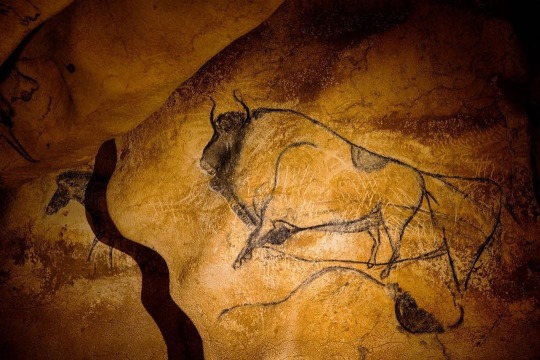





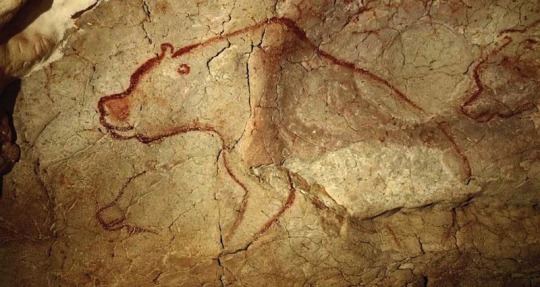

The Chauvet cave, France, the art of prehistory.
In 1994, three friends discovered in the south of France a cave with magnificent cave paintings, more than 30,000 years old.
Under the ground of the Ardèche region, an invaluable treasure is hidden for its antiquity, its conservation and the pictorial quality of the representations; one of the oldest and most splendid examples of Arieñaciense parietal art, dating approx. between 40,000 and 30,000 B.C.
https://www.instagram.com/p/BWfRerMFMCO/?igshid=yqzbqgvny71t
97K notes
·
View notes
Text
I saw a post discussing this, but rather than clown on it I decided to make my own.
The single most telling Western-colonial-Christian thing to ever seep into Heathenry is our need to separate things into clear, nonoverlapping categories.
The view of categorizing things came about during the Victoria Era with the rise of Natural Sciences and species classification. We've tried to cleanly parcel off pretty much every concept into their own self-contained containers since then.
This categorical thinking runs rampant in modern American Heathenry, particularly with how we define deities and spirits. There's all this nit-picking over the differences between the Aesir and Vanir, "rökkr" and "thurs," which spirits we should worship and which we shouldn't, and all this little minutae.
But the Aesir and Vanir represent tribes, not species of gods. "Rökkr" is a new concept invented by Raven Kaldera for his Northern Tradition. "Thursatru" is also extremely new. For all our focus on reconstructionism, people seem to overlook how our very approaches to Heathenry are distinctly products of our own time and society.
The Old Norse made very little distinction between powers and venerated ancestors, gods, and spirits of all sorts. They saw these powers as a part of their lived reality, and in turn they told stories, formulated customs, and passed down superstitions about them. This is the very foundation of animism; the intersection and the experience of all these things.
I can't speak for everyone here, but the kind of spiritual reconstruction I'm personally interested in is reconstructing the mode in which the Norse may have viewed the world, not just their means of practice. This is why I call my heathen path forn sidr ("old ways") even though some of it seems modern and new; it operates off of a similar OS to what the Norse used (to my best understanding of it, that is).
I have no problem with people finding categories useful. We should, however, be aware that this is something we're introducing to Heathenry, rather than something that has always been there or was lost to time. Labels are a self-adopted thing, after all. They serve us rather than exist as things we must adhere to.
I feel like this whole thing is something we need to talk about a lot more in Heathenry.
533 notes
·
View notes
Text
youtube
The Law You Wont Be Told:
Jury Nullification
"Did you know that juries have the right to nullify the Law? Very few people know that. Actually that was what the Magna Carta was all about, the barrons did not drag King John to runny meat, and starvation rations, and hold him prisoner, and forced him to sign that document just so that juries could ratify what the government has decided to do.
The whole idea of Magna Carta was that juries could make up their own mind what laws they were willing to have imposed upon the English population, and this is been upheld repeatedly as in the trial of William Penn in 1690. William Penn was technically guilty of speaking in public, that was the law at that time if you had unpopular religious opinions - you couldn't speak in public.ttthe jury refused to convict him, and the judge ordered the jury locked up until they would convinct him. The jury kept being brought back to court every day from the Tower of London and said we still find the defendant innocent until it became the biggest controversy in London and finally the judge admitted that you already did have that right.
The United States Supreme Court upheld that right so in the 1890s in a celebrated case where they ruled that the jury has the right to nullify the Law - the purpose of the jury system is that twelve people selected at random can speak for the whole Community about what laws they want imposed on them. The Supreme Court also ruled that the judge doesn't have to tell that law to the jury.
Do you know what judge is? A judge is a law student who marks his own examination papers, just like The Pope is a theology student who makes his own examintion papers. The Pope was declared Infallible by the Council of Cardinals. But there's not one Catholic in a million who can tell you when the Council of Cardinals became infallible.
If the Council of Cardinals is not infallible, then they might have been wrong when they said the Pope is infallible. But to prove The Pope is infallible, you've got to prove the Council of Cardinals is infallible. To prove the Council of Cardinals is infallible you've got to prove the people, who select the people who get on the Council of cardinals, are infallible. You turn into infinite regress that way.
It's that's the same thing with the judges, infallible human beings have not been found yet and you have the right to your own conscience. If you ever called up for jury duty, you can decide for yourself - you don't have to follow the judge's instructions.
Just remember if you're on a jury and somebody is charged with possession of some consciousness altering substance, if you're in favor of people changing their consciousness, you don't have to believe it when the judge says, "you must find him guilty" - You can judge by your own conscience."
- Robert Anton Wilson
16 notes
·
View notes
Text
Oðinn: Unhallowed Hallow
It is the first of November. All-Saints Day. The Feast of All-Hallows. All part of Allhallowtide.So what do these Christian festivals have to do with the Old Man?
Nothing - and perhaps everything.
There are rhythms in the world which are quite apart from what we moderns might call ‘religion’, Movements of landscape, climate, geography, psyche and soul which have little to do with what should be and everything to do with what is.
Here in the Northern Hemisphere, it’s autumn, or near-as-damnit. Darkness comes, and there’s nothing we can do to stop it, no matter how many watts we burn through, how many turbines we turn with fire and water.
“Darkness precedes light and She is Mother.”
In 1084, that inscription was made on the altar at Salerno Cathedral, just two decades after the Normans conquered England, and less than a hundred after the Icelanders had converted to Christianity.
Consider this, consider myth-time and realise it has its own pulse. It may quicken and slow as the situation dictates, may race in moments of frenzy, may ease and move with languid inhuman patience, spiralling out into forever.
Consider that for a child, a year may as well be an eternity, a season seemingly endless.
tide (n.) Old English tid “point or portion of time, due time, period, season; feast-day, canonical hour,” from Proto-Germanic *tidiz “division of time” (cognates: Old Saxon tid, Dutch tijd, Old High German zit, German Zeit “time”), from PIE *di-ti- “division, division of time,” suffixed form of root *da- “to divide, cut up” (cognates: Sanskrit dati “cuts, divides;” Greek demos “people, land,” perhaps literally “division of society,” daiesthai “to divide;” Old Irish dam “troop, company”).
Meaning “rise and fall of the sea” (mid-14c.) probably is via notion of “fixed time,” specifically “time of high water;” either a native evolution or from Middle Low German getide (compare Middle Dutch tijd, Dutch tij, German Gezeiten “flood tide, tide of the sea”). Old English seems to have had no specific word for this, using flod and ebba to refer to the rise and fall. Old English heahtid “high tide” meant “festival, high day.”
The ebb and flow has its own sense, its own rhythm. This is the time for the in-between, not because of any so-called ‘veils’ falling or thinning, but because of the rhythm of light and darkness, of Sun and Earth, of blood and fire and voices raised in song. Like it or not, the West is embedded in Christian culture - for a thousand years, Christians have known this time and tide, to say nothing of the pagans who came before and interwove themselves between them.
Ten centuries. But the rhythm is older than that, for it’s brought by the darkness. It’s brought by the harvest’s end, and the drawing close together against Winter’s-Nights, against a time when the earth gleams with frosted skin, when winds howl and bare branches beat out the ancient refrains, the clattering bone-rattles and the bony-scratches on wood, stone, and skin.
Were there no Church grouped around the Christ, were there no memory of the old gods, no songs and stories to inspire us, to incline our minds to the presence of the numinous Powers, the Hallowtide would still come.
hallow (v.) Old English halgian “to make holy, sanctify; to honor as holy, consecrate, ordain,” related to halig “holy,” from Proto-Germanic *hailagon (cognates: Old Saxon helagon, Middle Dutch heligen, Old Norse helga), from PIE root *kailo- “whole, uninjured, of good omen” (see health). Used in Christian translations to render Latin sanctificare. Related: Hallowed; hallowing.
And so would he.
II
saint (n.) early 12c., from Old French saint, seinte “a saint; a holy relic,” displacing or altering Old English sanct, both from Latin sanctus “holy, consecrated” (used as a noun in Late Latin; also source of Spanish santo, santa, Italian san, etc.), properly past participle ofsancire “consecrate” (see sacred). Adopted into most Germanic languages (Old Frisian sankt, Dutch sint, German Sanct).
Originally an adjective prefixed to the name of a canonized person; by c. 1300 it came to be regarded as a noun. Meaning “person of extraordinary holiness” is recorded from 1560s
It’s sometimes hard to conceive a place for the gods in the modern world. The old names and titles seem distant, disconnected from our lives in the 21st century. So perhaps it’s no wonder they come to us in new forms and new shapes, either erupting into our minds and bodies, impressing themselves on our existences via media and patterns of daily life
Or, sometimes, we find ourselves seemingly alone, only to see them emerge, resolve while we’re not paying attention, so that one moment, it is as if they never existed - and the next, our senses are snared, and we wonder how in all the worlds we missed them before now.
But there are things outside modern life. Things which modern life finds uncomfortable, or tries to route around. The darkness is one such thing. There is no holding back the inevitable shift of the Earth at its Solstices and Equinoxes, these fundamental turning points in our lives and existences. Whether we like it or not, there are times and tides when things become different.
wyrd see weird.
weird (adj.) c. 1400, “having power to control fate, from weird (n.), from Old English wyrd "fate, chance, fortune; destiny; the Fates,” literally “that which comes,” from Proto-Germanic *wurthiz (cognates: Old Saxon wurd, Old High German wurt “fate,” Old Norse urðr"fate, one of the three Norns”), from PIE *wert- “to turn, to wind,” (cognates: German werden, Old English weorðan “to become”), from root *wer- (3) “to turn, bend” (see versus). For sense development from “turning” to “becoming,” compare phrase turn into “become.”
versus (prep.) mid-15c., in legal case names, denoting action of one party against another, from Latin versus “turned toward or against,” from past participle of vertere (frequentative versare) “to turn, turn back, be turned, convert, transform, translate, be changed,” from PIE *wert- “to turn, wind,” from root *wer- (3) “to turn, bend” (cognates: Old English -weard “toward,” originally “turned toward,” weorthan “to befall,” wyrd “fate, destiny,” literally “what befalls one;” Sanskrit vartate “turns round, rolls;” Avestan varet-“to turn;” Old Church Slavonic vrŭteti “to turn, roll,” Russian vreteno “spindle, distaff;” Lithuanian ver čiu “to turn;” Greek rhatane “stirrer, ladle;” German werden, Old English weorðan “to become” (for sense, compare turn into); Welsh gwerthyd “spindle, distaff;” Old Irish frith “against”).
Things that, when you hold them against the light, well, an altogether different picture may emerge.


Things that may only be seen, and understood at the juxtaposition of light and darkness, figures which stand at the boundary between the known and the unknown, that lead us to acknowledge our own primordial nature. That with implacable, inhuman, immortal patience, cause us to confront our own mortality and powerlessness. That force us to make a choice-that-is-no-choice:
“There is no coming to consciousness without pain. People will do anything, no matter how absurd, in order to avoid facing their own Soul. One does not become enlightened by imagining figures of light, but by making the darkness conscious.” - CG Jung
(”It hurts to become”, says the Gallows God across the centuries,between the silences, howling in the night amidst the roaring of the wind and the creaking of the Tree)
We are beckoned into our inevitability at such times, into the processes that lead us to the-here-and-now, and it is only in that state that we can truly acknowledge Memory. Faced with the infinite darkness, the Mother of Light itself, we are once again cast into womb-and-tomb.
The knowledge that we are surrounded by the Larger, nourished, strengthened, delivered and doomed by it. We become aware that we are in fact, only the current iteration of our ancestors, and in this awareness, in the darkness we take our place amongst the Dead - we wear the masks, the costumes of fear and dread transformed into joy, mirth and celebration of our part in a living, breathing kosmos.
We are presented with the reality that the Dead are always with us, at every moment, in our every moment. We acknowledge that it is they who birthed us, that we emerge from the tomb, and are presented with an inner-soul-light.
And by that weird light, that wyrd-light of fox-fire that dances in the dark we perceive the restless nature of existence itself, the Dance of the Dead. We, living beings, suddenly masked and like the dead, are met by Grimnir - the Masked God, the Hooded One, and he speaks:
Would you know more?
III
Oðinn has many names, any many more secrets besides. One of the biggest is perhaps the most obvious and yet often overlooked:
Oðinn itself is a heiti - a title. His name, as with other godnames and beings of the period, is oblique, a dual-purpose concealer and revealer of his nature. If he ever had a ‘true name’ it is long lost, overwhelmed by his sheer presence.
Stitched together in a patchwork cloak, his many names swirl about him like a storm, the inexpressible in-betweeness of his nature shining through the rough scars and tattoos by which our perception attempts to grasp him.
The double-headed ambivalence of him shifts and dances, pulses and fluxes, drawing us ever on. And how can it be otherwise? For is not the master of wodh, the ecstatic, feral frenzy that gives bloody birth to poets and kings? The stirrer of souls, the rune-shrieker, the tactical striker, the master manipulator, the oath-breaker and worker of evil?
He’s the Uncanny Bastard - Das Unheimliche:
The uncanny (German: Das Unheimliche, “the opposite of what is familiar”) is a mixture of the familiar and unfamiliar that is experienced as being peculiar.[1] The psychological concept of the uncanny as something that is strangely familiar, rather than just mysterious, was perhaps first fixed by Sigmund Freud in his essay Das Unheimliche.[2][3]
Because the uncanny is familiar, yet incongruous, it has been seen as creating cognitive dissonance within the experiencing subject, due to the paradoxical nature of being simultaneously attracted to yet repulsed by an object.
[…]
In The Will to Power manuscript Nietzsche refers to nihilism as “the uncanniest of all guests"
[…]
Uncanniness was first explored psychologically by Ernst Jentsch in a 1906 essay, On the Psychology of the Uncanny. Jentsch defines the Uncanny as: being a product of ”intellectual uncertainty; so that the uncanny would always, as it were, be something one does not know one’s way about in. The better oriented in his environment a person is, the less readily will he get the impression of something uncanny in regard to the objects and events in it.“
[…]
Freud draws on a wholly different element of the story, namely, “the idea of being robbed of one’s eyes,” as the “more striking instance of uncanniness”
Freud goes on, for the remainder of the essay, to identify uncanny effects that result from instances of “repetition of the same thing,” linking the concept to that of the repetition compulsion.[5] He includes incidents wherein one becomes lost and accidentally retraces one’s steps, and instances wherein random numbers recur, seemingly meaningfully (here Freud may be said to be prefiguring the concept that Jung would later refer to as synchronicity). He also discusses the uncanny nature of Otto Rank’s concept of the “double.”
Freud specifically relates an aspect of the Uncanny derived from German etymology. By contrasting the German adjective unheimlich with its base word heimlich (“concealed, hidden, in secret”), he proposes that social taboo often yields an aura not only of pious reverence but even more so of horror and even disgust, as the taboo state of an item gives rise to the commonplace assumption that that which is hidden from public eye (cf. the eye or sight metaphor) must be a dangerous threat and even an abomination - especially if the concealed item is obviously or presumingly sexual in nature.
(Bolding mine, from Wikipedia)
As concealer and revealer, the blind guest and Lord of the Host of the Dead, he stands there, between the darkness and light. As the Terrible Old Man, the Awful Stranger, he is the Watcher from the Dark, the boundary crosser, the Eldest Ancestor, the healer who is missing an eye, his ambiguity and fluidity makes him serve as soul-stirrer and guide.
He is the omnipresent eye on you, the thing that watches you as you pass through the forest, that sets the hair on the back of your neck to rise, the monstrous affront to all that is holy, and in that affronting-againstness is rendered a very peculiar kind of hallowed, a precise holiness as strange as burning darkness or the sun at midnight
Just as his his heroes are monsters who fight monsters, so he is their exemplar - the liar who speaks truth, the killer who prizes life, the preserver of the worlds, and their destroyer. The blasphemous saint, the daemonic god of darkness who brings wisdom and light, the strife-bringer who soothes away cares, and teaches freedom by inescapable inevitability
He is hunger, insatiability, need, desire, fury, fire, ice, joy, terror, glory and endless incompleteness, all knotted triply and more Whole than Whole
He is god of kings, of poets, of madfolk and cripples, of the sick and the able. Witch and warlock, monster and beloved, he is High, Just as High, and Third
He is Himself.
549 notes
·
View notes
Text
One of my favorite @coldalbion posts!
Gods as personifications
There’s a post in the #heathen tag where someone responds to an ask about being Asatru while not believing in the gods as literal beings. OP regards the gods as personifications of phenomena, natural and otherwise. Leaving aside the fact that not all Heathens are Asatru
They’re of course free to view things as they wish, but their comment that they view Odin as the personification ‘of knowledge’ makes me side-eye the whole notion of gods as personifications. Mostly, I think that’s because when most people discuss personification, they end up being reductionist. It’s the thing I raised in my Gods Of post.
If we go with the OP’s Odin-as-personification-of-knowledge, where do his exploits as necromancer, as sexually and morally ambiguous wanderer, as kingmaker and kingbreaker fit? Wherefore lies the poetry and madness and murder, the terror and the ecstasy?
If Thor is merely the personification of thunder, what of his name as Deep Thinker? What of his role as hallower of brides and hofs?
I’m not trying to police anyone’s beliefs here - just querying the whole conception of ‘personification’ as a ‘reason’ for gods and spirits. If they arise from singular phenomena, whether they be anthropomorphized or not, then why does mythology ascribe personality and multiple facets and roles to these entities?
The myths present them as complex, rounded beings - and do so the world over, in many different cultures. As pure personifications, it doesn’t really make sense for them to have these overlaps, does it?
In fact, the more I consider the idea, the more I recall that the Death of the Discworld novels by Terry Pratchett is probably the best example of the complexity of the issue. An eight foot skeleton with a scythe and robe - yet as the books go on, we find he has hopes, dreams, cares, likes curry and cats. He adopts a daughter.
As a personification, Death soon ceases to be that. He develops a character, or one is shown to us, because of events in the world. He exists independently of what he is supposed to personify.
He exists in the world of the books as his own thing, his own identity. What was originally a gag, is revealed to be a rich and complex being.
Now, some might ask if, by saying this, I am not giving ammunition to the idea that gods may have begun as personifications? I’d argue that this is not the case, precisely because all of the Discworld is fictional. It emerged from the mind of one talented man,
Whereas, the gods and spirits of real-world cultures are just that - there is a definitive real-world component. They have enough effect to have temples and shrines erected for thousands of years.
A disbelief in such things as entities in the world, has only existed en masse for maybe four centuries at a generous guess. Conservatively, as far as records go, we have several thousand years ( and probably much longer than that) where gods and spirits were facts of life.
They were as much a thing as the weather.
Modern materialist arrogance would have us act as if our ancestors were stupid, savage creatures, benighted by ignorance. Yet for all that supposed ignorant superstition, all that illusion and misperception, the fact is civilisations and empires rose and fell. Humanity prospered.
Human success and survival wasn’t accidental until the so called Enlightenment. On the contrary, it was borne of human ingenuity and skill, of understanding and working with the environment as best we could.
I’m not saying this was down to human belief in gods and spirits, or even the lack thereof. What I am saying is that there is a modern tendency to reduce and grossly simplify the complexity of lived experience - to place the ambiguity and strangeness of life into discrete categories and to manipulate things into new shapes that bear little resemblance to the original experience so as to make them ‘fit’ that box.
The idea that people could live in an ambiguous world seems anathema to moderns - that an existence of both-neither-maybe-all-ness might not be some flight of fancy, but instead, be intensely practical is mindboggling for many people today.
The fact is, there are many complexities which give rise to human perceptions and awarenesses. By definition, gods and spirits are ambiguous - they are weird, strange and different constellations of experience having and being had by humans and other creatures.
What they are, if they are, at all, is strangeness - wyrd. If they exist solely in the human mind, they are still wyrd. And if, as matches my experience and (apparently) thousands of years of human history, they’re in the human mind and outside it too…
Then they’re more than something that can be reduced to one thing, one category, one origin, just like humans. Their complexities, at the very least match our own. We are more than our jobs. More than our names. More than biological offspring of our parents.
If we, as products of cells meeting, of chemical reactions, are capable of all that humans are, then what?
If we reduce the universe to a mere exchange of energy, which it is, does this in any way serve us? Is it useful, or does it serve no other purpose than to produce a sense of superiority, an illusion of control, because we ‘know what it is’?
I am meat and chemicals. A meaningless biological automaton.
Does this serve, or in such reduction, am I not levelling and concealing much that is helpful, useful and practical?
Am I not ignoring my capacity to bring wonder, joy, rage, laughter, comfort, healing and harm to the world?
Isn’t it better for me to acknowledge that I know not what I am, from moment to moment? That I exist as myriad different images inside the minds of all who read these words? I’m just a bearded frothing madman. Just a guy in his thirties typing away on a website, and yet there’s a chance these words might catch fire, might stick in someone’s consciousness.
And in doing so, might not I alter the chemical makeup of someone’s body with words, stretching out across the the planet as I stir thought or emotion? In doing that, what category do I belong in? As these words are written, what am I? Perhaps they might be read long after I am dust and bones, or am old and dying? Anything is possible isn’t it?
I’m just a man, and if I’m all that as a man, then what happens when a person encounters a god or a spirit? What happens if the so called personification of knowledge comes upon you and leads you to open your heart to your beloved, or whisper words that aid in healing after a lifetime of abuse?
What happens if the so called personification of thunder drives away your nightmares and surrounds you with a sense of strength and safety, who utters to you without words, the sense that you are loved and protected, because that’s what Thor’s been doing for folk for centuries?
What then, eh?
559 notes
·
View notes
Note
Hi. Hail, as it were. How do you think Old One Eye feels about the racism being laid out in his name, what with all the white nationalist “Wotan”ists out there? How does their worship affect your own?
How does Wotanist shite affect my own worship? Short answer is that it doesn’t. I get that some folks are annoyed/scared of being tarred with that brush. I’m not, because I’m a crippled, hanged/strangled and hence braindamaged bisexual guy - my god is a queer shape-shifting poet-warrior-necromantic-sorcerer-strategist infused with and master of all the creative fury, the wordless rage, in the whole damn kosmos. He’s the Old Grey Wolf prowling just beyond the firelight, the uncanny wandering Stranger and the ever generous host welcoming guests to his hall. Death-bringer, Life-giver, Soul-stirrer. Ever-desiring strife-maker whose thirst for knowledge remains ever unslaked. The Father to his Lost Boys and Girls and his Anywhichway Folks.
He’s Grandfather Raven, lord of the carrion birds who feed on the dead, consume the rotting flesh, the things forgotten and cast aside; transforming the abject into purest vitality.Singer and Soother, Corpse-Speaker.
Wild Hunter riding with the Restless Dead across the sky, hoofbeats like black iron thunder and carrion cry.
Mad One, Healer, Binder, Loosener. Killer, Lover, Masked and Hidden. That’s my god.And I do not think he cares one jot for the colour of your skin, the shape of your genitals, or whether you step into manhood, womanhood or somewhere - even nowhere - in between. I do not think, generally, he cares what kind of person you want to fuck, marry, or loveMy god wants what he wants, makes deals, walks his own road.And I do not put it past him to use any prevailing conditions to his advantage, because that’s what a strategist does. And if the upsurge in White Supremacy allows some folks to come to know him in a fashion which is more connected, more intimate, I doubt he’d ignore that advantage.Let me be clear: I do not think the One who gave rise to the Havamal approves of racism, or White Supremacy. I suspect he finds it xenophobic and foolish. I suspect he found Nazi atrocities bleakly awful, and Himmler’s plastic attempts at some kind of quasi-neopaganism to be dark-but-paltry echoes of something deeper.I suspect that he is making use of McNallen et al because they exist, as a raven makes use of a corpse.I could be wrong. But I do not think so. Because my god does everything with an agenda - everything with very particular framing. To kill a man is very different to sacrificing him, as an example. That ambiguity, that difference? That’s where the Old Man dwells.dwell (v.)Old English dwellan “to mislead, deceive,” originally “to make a fool of, lead astray,” from Proto-Germanic *dwelan “to go or lead astray” (source also of Old Norse dvöl “delay,” dvali “sleep;” Middle Dutch dwellen “to stun, make giddy, perplex;” Old High German twellen “to hinder, delay;” Danish dvale “trance, stupor,” dvaelbær “narcotic berry,” source of Middle English dwale “nightshade”), from PIE *dhwel-, extended form of root *dheu- (1) “dust, cloud, vapor, smoke” (and related notions of “defective perception or wits”).Related to Old English gedweola “error, heresy, madness.” Sense shifted in Middle English through “hinder, delay,” to “linger” (c. 1200, as still in phrase to dwell upon), to “make a home” (mid-13c.). Related: Dwelled; dwelt; dwells.
Be Seeing You
122 notes
·
View notes
Text

Proof of life 🤘 Go watch #Hellier on Amazon Prime and YouTube. I'm in two episodes of season 2 conducting #hypnosis experiments.
2 notes
·
View notes
Text
“The world may be mean, but people don’t have to be, not if they refuse.”
— The Underground Railroad, Colson Whitehead
279 notes
·
View notes
Text
a polytheistic worldview/theology is comforting in that deities/gods are neither omniscient nor omnipotent; there are gaps in their power and influence, holes in their knowledge, secrets even they do not know. there is not a claim to wholeness/totality, but a fractured knowing and experience that is richer for all of the bright, sharp edges.
2K notes
·
View notes
Photo
Anyone know if this deck is real? The artist?

99 notes
·
View notes



